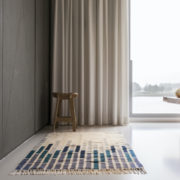A stylish and summer hand-woven rug. Exclusively for the NRC webwinkel, Fair Fabrics, in collaboration with one of its Tunisian artisan workshops and the Dutch designer Willemiek van Kuijlenborg, had a wool rug made and produced in a limited edition.

Photocredits: Geert van Hertum
Just as for many other entrepreneurs, the past period has not been easy. The workshops in Morocco and Tunisia were closed, the artisans had no income, the future was – and still is – very uncertain and the transports to the Netherlands are only finally (but laboriously) underway. Fortunately, this project has now come to a good point: the small cooperative in Tunisia does not have a communal workshop, but this meant that they were all able to work at home and earn an income in the past months. This makes logistics more complicated, but this was also their survival mechanism!
The small artisan workshop in the North of Tunisia is being runned by Sihem. She learned the art of rug weaving from her mother. She has passed on the skill to her two daughters, Sarah and Nour, who help her with designs for modern versions of traditional rugs. Sihem has managed to revive a craft that had all but disappeared from her village. She works with four or five other women weaving rugs and distributes these through local fairs and a crafters’ network.

Photocredits: Family Sihem
Both her daughters aren’t into the loom work. “We’re not patient to learn it because it’s hard. Everything has to be perfectly made without flaws. In fact, all we do is create new designs, ideas, and colors, but when it’s about weaving we get lost.”
“Growing up with a mother like mine influenced me.
We do see the world differently,
but the customs and the traditions we were taught remain the same.”
Also Sihems mother is always there to help them. She’s more experienced and helps to clean the wool. The women Sihem works with also do some farming and during the olive harvest they don’t come to work. They can’t depend on weaving only since handcraft is no longer a profitable business.
“Not going to school is the thing I regret most in my life.”
Sihem regretted that she didn’t go to school, her father couldn’t afford it because they were seven kids. That’s why she encourages her children to keep studying and achieve what she couldn’t. The people in her village are really hard working, women work as much as men. Women who live there are real fighters, they help their husbands with everything they do. “This is where I belong. It’s my origin and the land of my ancestors.”

Photocredits: Moncef Ben Rajeb
My mother produces wool in the traditional way and she teaches us how to separate the threads and attach them the loom. She learnt all the skills from her mother. When she was a little girl she’d watch her weaving. She used to grab the shed stick and hold it like a pen.
Her mom was taught how to do it by her mom. Long ago, women used to spin the yarn. When she went out she’d sneak in and spin some wool. Sometimes she hurt her finger so she’d run to her room and hide it from her mom.
You can feel that some rugs have a soul, but if someone doesn’t make it with love and passion it won’t be appealing. I think passion is necessary to produce good work. Even if it’s to sell, it should be made with passion.

Photocredits: Geert van Hertum
Parts of this interview are from the documentary “The Thread”. A film by Brian Tilley.

